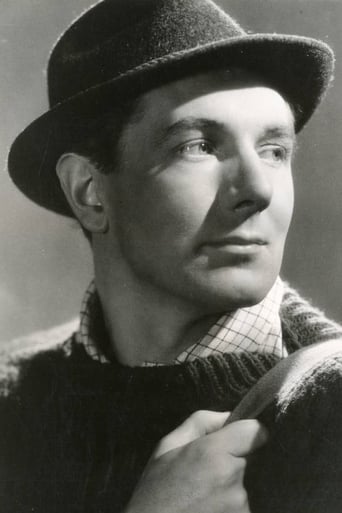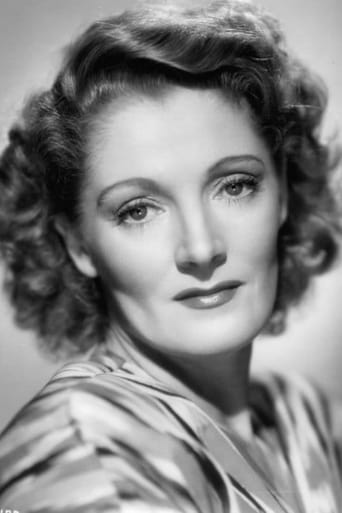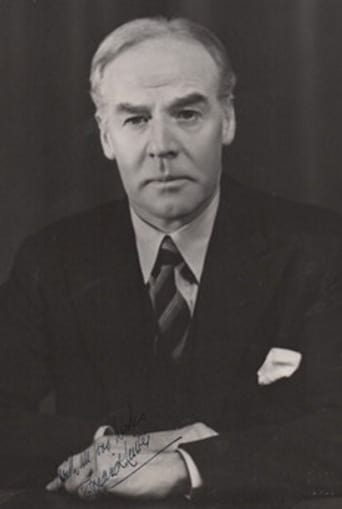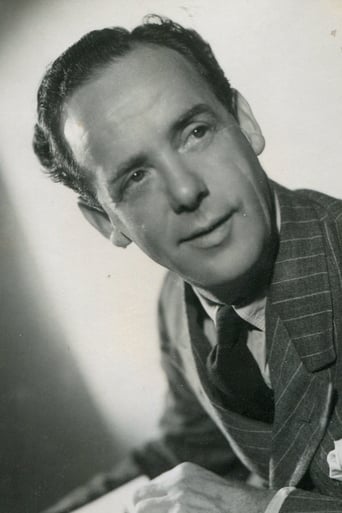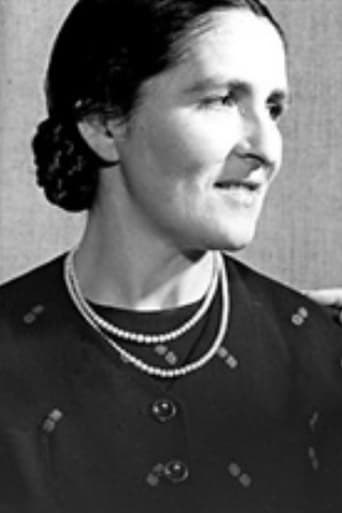XoWizIama
Excellent adaptation.
CommentsXp
Best movie ever!
Mathilde the Guild
Although I seem to have had higher expectations than I thought, the movie is super entertaining.
Bob
This is one of the best movies I’ve seen in a very long time. You have to go and see this on the big screen.
BOUF
BEWARE! A SPOILER re the ENDING. A Czech, escaping from the Nazis, Michael Redgrave, (the nominal star and lead character), assumes the identity of a dead British officer to evade punishment. It's a perfect part for Redgrave, who must be one of the most diffident performers in the history of the movies. What does he actually want or feel? And he's not fascinatingly enigmatic, he's irritating. Redgrave's character is distant, unhappy with who he is, even unhappy with who he might be - at the most, 20% comfortable in his own skin. (Assuming someone else's identity seems to be what an actor like Redgrave must do, so he can live in an agony of semi-persona.) Half way through this curious, but interesting film, the Redgrave character, the Czech, decides to take up a correspondence with the wife of the British officer whose identity he's assumed. Then he'll have something to live for, someone to communicate with. After all, all the 'normal' chaps have a girl to write to. He doesn't seem to consider how much emotional harm he might do the wife, who believes she is corresponding with a formerly cold husband, who has suddenly found a warmth in his poetic descriptions of everyday life in the camp. Her descriptions of life in their little English village are read out to the chaps in the camp, and at last Mr Diffident seems to belong to something, even if it is all a lie. Meanwhile, there are various other love affairs, which have been interrupted by the war; the male halves of these affairs are in the camp; all the affairs are on rocky ground. All are swiftly, abruptly and unconvincingly resolved towards the end of the film, because they don't matter nearly as much as the film's loving commitment to the camaraderie of the camp (there's even a nostalgic shot of the abandoned camp, after the prisoners have all been repatriated as though the film yearns to be back there, rather than with these rather contrived, post-camp love matches). The most unconvincingly resolved love 'affair' is that between the Redgrave character and his ersatz wife. She's shocked that the hubby she thought had transformed himself into a poet, turns out to be a Czech impostor, and sends Redgrave - who now wants to belong to her - packing. But something about his sincere diffidence changes her mind and she takes him on. The End. A shame because it's a very strong dramatic idea, which is unsatisfactorily resolved The reason, I assume, for the perfunctory way with which all the 'love stories' are treated is either the film's running time, or that the film is really a love story about chaps, carrying on regardless of their aching hearts. The characters and scenes in the camp are well drawn; as a document of their camaraderie and coping capabilities, it's quite moving, but the love stories need a lot more work.
bkoganbing
In Stalag 17 there's a famous scene and line where the audience who now knows that Peter Graves is an agent is pitching horseshoes and trying to obtain information, as he lands one, an off screen voice says 'that's a ringer.'The British prisoners, mostly from Dunkirk, who because of capture sat out the war have a ringer among them in The Captive Heart. It's Michael Redgrave, but his is not an espionage mission. He's a Czech who's escaped from a concentration camp and found himself on the battlefield where the defenseless British have surrendered. He takes the identity and uniform of a dead officer and is then 'caught' by the Germans.To keep up the deception Redgrave writes letters back to his 'wife' in the United Kingdom, played by his real life wife Rachel Kempson. She and her real husband have not gotten along and truth be told his call up for war was greeted with some relief. But Redgrave wrote such poetical stuff she falls for him by correspondence.Although Redgrave's story is the main plot line, there are others that are nicely acted. Young Gordon Jackson goes blind because of lack of proper care for his wounds and he gives a touching performance. And chief officer of the prisoners, Basil Radford is an inspiring leader among them, trying to keep up morale as best he can.The Captive Heart is a tandem pulling of the strings on the auricle and ventricle of the viewer. It's a fine wartime romantic drama with equal accent on the war and the romance. It was done just as Michael Redgrave was reaching his heights as one of the United Kingdom's premier players. Try not to miss it if it is broadcast.
James Byrne
THE CAPTIVE HEART was the first WW2 film to be partly produced in Germany since the war started. The prison camp scenes were reconstructed at Morlag POW camp in Westertimke, Germany, and are very authentic. Karel Hasek (Michael Redgrave), a Czech Officer, has assumed the identity of a dead English Officer, Captain Geoffrey Mitchell, but gets captured and is interned in a German POW camp. He is forced to write to the dead man's wife, disguising his writing by injuring his hand on purpose. Mrs. Mitchell (Rachel Kempson) is pleasantly surprised by the warmth of the letters, as her marriage was on the rocks before the war started. Others in the POW camp include two former building trade partners, Corporal Ted Horsfall (Jack Warner) and Private Dai Evans (Mervyn Johns), who learns that his wife has died during child birth. Lieutenant David Lennox (Gordon Jackson) loses his sight and breaks off his engagement to Elspeth (Margot Fitzsimmons), while Lieutenant Stephen Harley (Derek Bond) is distraught after receiving a letter which states his wife is being unfaithful. Private Matthews (Jimmy Hanley), a former burglar, puts his questionable skills to good use when everyone is handcuffed in a reprisal by the orders of Herr Forster (Karel Stepanek), by immediately releasing all the prisoners. Repatriation arrives at last, and Matthews sacrifices his freedom by allowing Hasek to go in his place, and he visits the home of Celia Mitchell. She is shocked when hearing of her real husband's death, but eventually she falls in love with Hasek. Lennox and Harley are reunited with their loved ones, and Evans meets his daughter for the first time. Working as a technical adviser on THE CAPTIVE HEART was Sam Kydd, who also had a bit part as Private Sam Grant. This was Sam's first film appearance since his own experiences of captivity in a POW camp, which he related vividly in his book "For You The War is Over". If you can manage to get your hands on a copy of this marvellous book you will be rewarded for your efforts. It works as a perfect compliment to THE CAPTIVE HEART, and gives a greater understanding of the life of a POW in WW2. THE CAPTIVE HEART is a mature and realistic war film and is highly recommended. One of the scriptwriters, R.N.V.R.Lieutenant Guy Morgan, had actually been a prisoner at Morlag. The movies original title was "Lover's Meeting", but at the suggestion of future British TV stalwart Jack Warner, the title was changed to THE CAPTIVE HEART.
Dr. Barry Worthington (shrbw)
The prison camp is, in many ways, a metaphor for wartime Britain and its postwar hopes and aspirations. 'All sorts and conditions of men' are herded together in the camp, and despite the underlying tension, the boredom, and the self doubts, they must try and get along with each other. Indeed, it goes far deeper than that - they must try and look out for each other and protect each other.And so they encourage the blind lad in his efforts to learn brail and come to terms with his blindness. A young 'tearaway' (a pre-war thief)comes to realise that even he has something to contribute. As the others try and think up a way of protecting the identity of a Czech hiding amongst them, he confesses that he knows how to open a safe, and can break into the orderly office and destroy the incriminating evidence.There are little touches of humanity in terrible situations. The order is issued to manacle the prisoners as a reprisal for some Allied slight (this actually happened), and the elderly German reservist guard tries to indicate to the blind prisoner that he is only 'obeying orders' and doesn't want to do it. The invalid wife of a prisoner is told, back in England, that it is too risky to have her husbands baby, but she sacrifices herself in the hope that he will have a child to come home too. The blind lad tries to put off his girlfriend because he doesn't want to be a burden to her.Some people find the main plot line a little contrived, but it is fascinating to see two strangers fall in love through a pretence. And so wartime Britain entered the postwar world with all its hopes and fears. Sadly, with no visible common enemy to unite them, many of these hopes of a common caring humanity were not to be realised.

